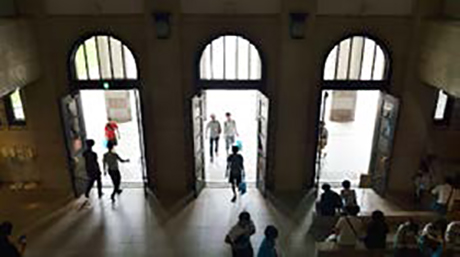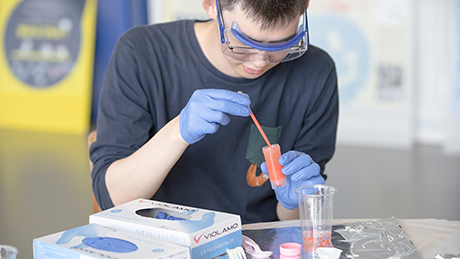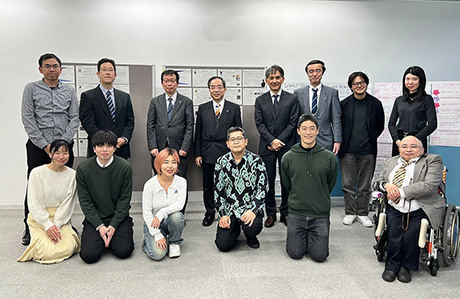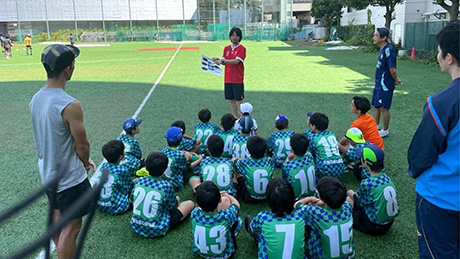Life Science and Technology News
Frontiers of Science and Technology
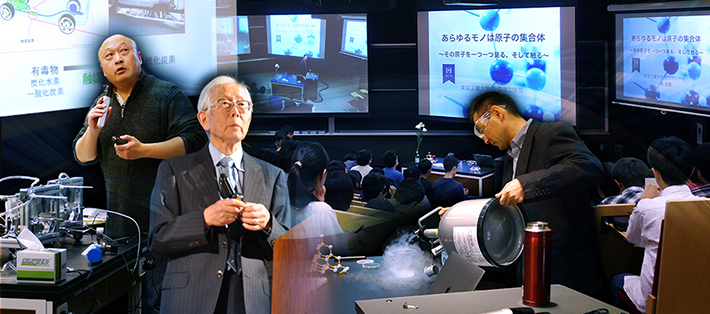
Education reform at Tokyo Tech has ushered in fresh changes since April 2016, which students and faculty members alike have embraced. One change aims to expose all 1st-year undergraduate students, including those in the Global Scientists and Engineers Program (GSEP)![]() , to leaders from various fields early in their undergraduate lives, allowing them to experience how these leaders approach difficult problems. Students can use these experiences to chart a future vision of themselves and then work backward to construct a plan for how they will proceed academically. Several new courses follow this concept. One of these is the Tokyo Tech Visionary Project
, to leaders from various fields early in their undergraduate lives, allowing them to experience how these leaders approach difficult problems. Students can use these experiences to chart a future vision of themselves and then work backward to construct a plan for how they will proceed academically. Several new courses follow this concept. One of these is the Tokyo Tech Visionary Project![]() , initiated by the Institute for Liberal Arts. Another is the Frontiers of Science and Technology course.
, initiated by the Institute for Liberal Arts. Another is the Frontiers of Science and Technology course.
Learning from front-line researchers and specialists
Traditionally, when students enter Tokyo Tech at the undergraduate level, they join an Academic Group![]() based on their personal interests, and learn within that group for their first year before opting for a specialization. Throughout the Frontiers of Science and Technology course, however, faculty members from the seven Academic Groups invite world-leading scientists and engineers to provide lectures to all participants, regardless of the Academic Group to which they belong. This allows students to more directly observe the links between society and the wide spectrum of science and engineering, and to begin thinking about where they want to position themselves along this spectrum.
based on their personal interests, and learn within that group for their first year before opting for a specialization. Throughout the Frontiers of Science and Technology course, however, faculty members from the seven Academic Groups invite world-leading scientists and engineers to provide lectures to all participants, regardless of the Academic Group to which they belong. This allows students to more directly observe the links between society and the wide spectrum of science and engineering, and to begin thinking about where they want to position themselves along this spectrum.
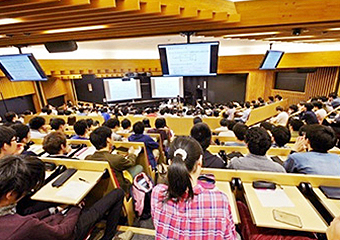
At the Tokyo Tech Lecture Theatre
Influential talks at the Tokyo Tech Lecture Theatre
Since the beginning of the course, the Tokyo Tech Lecture Theatre has been the venue for all lectures making up the Frontiers of Science and Technology. In 2016, the 5th Academic Group invited two project leaders from the Japan Aerospace Exploration Agency to speak about Akatsuki and Hayabusa2, two of Japan's newest space probes. The guest speaker for the 7th Academic Group focused on green fluorescent protein, the research topic of 2008 Nobel Prize laureate Osamu Shimomura.
Based on surveys, many of these lectures had a lasting impact on students in terms of their future direction and goals. This feedback prompted some Academic Groups to repeat their 2016 lectures the following year.
Results of post-course surveys in AY 2017
- Q1How new was the contents of the lectures?

- Q2Did your motivation to learn increase
through these lectures?
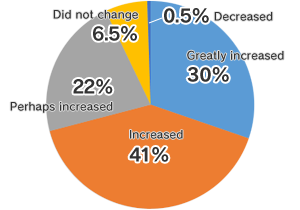
- Q3Did these lectures help you determine
the direction you want to take?

- Q4How did you feel about taking lectures
at the Tokyo Tech Lecture Theatre?
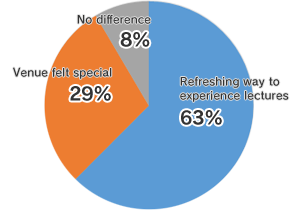
2017 lectures
| Academic Group | Name | Title | Affiliation | Lecture topic |
|---|---|---|---|---|
| 1 | Toshiaki Enoki | Program Officer | Japan Science and Technology Agency | The world of nanocarbons |
| 2 | Michikazu Hara | Professor | Tokyo Tech | Survival science |
| 3 | Ken Tanaka | Professor | Tokyo Tech | Assembling chrysanthemums to construct chiral compounds |
| Tetsuro Murahashi | Professor | The frontiers of complex chemistry — Technologies that make metals work within molecules | ||
| Taro Hitosugi | Professor | Atoms make up everything — see and touch them | ||
| 4 | Kotaro Tadano | Associate Professor | Tokyo Tech | Developing robot systems for laparoscopic surgery |
| Susumu Sato | Associate Professor | Tokyo Tech | Stirling engines | |
| Yoshihiko Wajima | Operating Officer | Honda Motor Co., Ltd. | Jet engine development at Honda | |
| Tohru Yagi | Associate Professor | Tokyo Tech | Machine tools | |
| Yun Feng Wu | Manager, Robot Business Division | Fanuc Corporation | Advanced industrial robots at Fanuc | |
| 5 | Masamichi Shimosaka | Associate Professor | Tokyo Tech | Opening up the future with big data and AI |
| Takashi Uehara | Head of Inonvation Lab | Mitsubishi UFJ Financial Group, Inc. | ||
| Taiichi Hashimoto | Data Analysis Team Leader | Data Labs / Clova Center, Line Corporation | ||
| Mitsuo Hashiba | General Manager | DMM.make AKIBA | ||
| Hiroshi Masuichi | Head of Communication Technology Laboratory | Fuji Xerox Co., Ltd. | ||
| 6 | Ryuji Fujimura | Associate Professor | Tokyo University of the Arts | Designing society through architecture |
| Takashi Imaishi | General Manager | Civil Engineering Department, Taisei Corporation | The Bosphorus railway tunnel — challenging severe marine environments | |
| Kazunori Ito | Coastal and Hydraulic Team Leader | Technology Center, Taisei Corporation | ||
| Yasuaki Nouguchi | Principal Chief Researcher | National Research Institute for Earth Science and Disaster Resilience | Disaster mechanisms | |
| Yuko Motai | Specialist | |||
| 7 | Hideki Taguchi | Professor | Tokyo Tech | The science and application of green fluorescent proteins |
| Yuki Yamaguchi | Professor | |||
| Satoshi Murakami | Professor | |||
| Hiroshi Kimura | Professor | |||
| Masayuki Takahashi | Specially Appointed Professor | |||
| Special lecture | Hideki Shirakawa | Professor Emeritus | University of Tsukuba | The discovery and serendipity of conductive polymers |
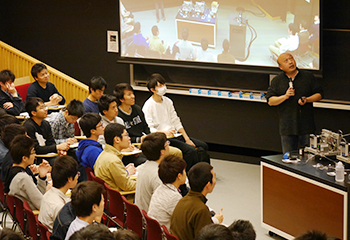
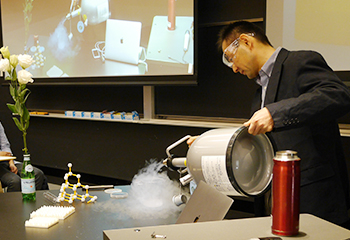
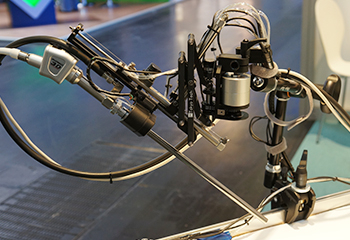
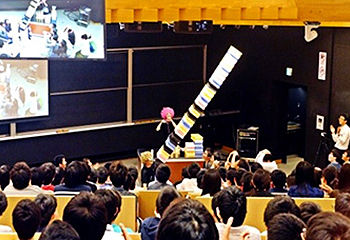
Special lecture
The discovery and serendipity of conductive polymers
Hideki Shirakawa, Professor Emeritus, University of Tsukuba
In both 2016 and 2017, the final lecture of the course was a rare moment with Tokyo Tech alumnus and 2000 Nobel laureate in Chemistry Dr. Hideki Shirakawa. During his talk entitled "The discovery and serendipity of conductive polymers," Shirakawa spoke not only about his award-winning research, but also shared his personal feelings concerning life as a university student and researcher.
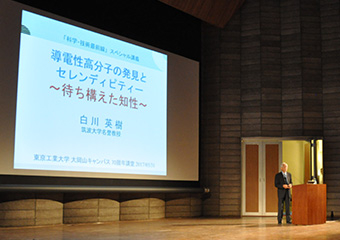
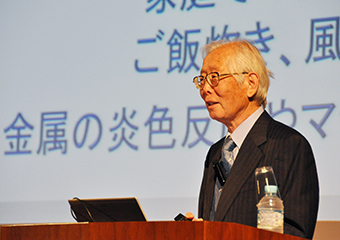
Backcasting the future — A strategic learning process
As expected, each lecture in 2017 was followed by a blitz of questions from the young audience. Enthusiasm was also clear in the post-course feedback, which was as positive as in the previous year. Many students felt that their live experiences with cutting-edge researchers boosted their motivation to learn.
The lectures, however, were only the beginning, and an important strategic learning process continues for each individual student during their undergraduate life. By encouraging participants to first consider a desired future and then backcast their path "from there to here," the Frontiers of Science and Technology course allows students to proactively set, establish commitment to, and — throughout their time at Tokyo Tech — explore a variety of incremental solutions to achieve their personal goals.
- First-year undergraduate education | Features of Tokyo Tech's Education
- 2017 Frontiers of science and technology
- Labs spotlight #41 - Taguchi Laboratory -
- Labs spotlight #10 - Yamaguchi Laboratory -
- Labs spotlight #48 - Murakami Laboratory -
- Labs spotlight #49 - Kimura Laboratory -
- Researcher Profile | Tokyo Tech STAR Search - Masayuki Takahashi
